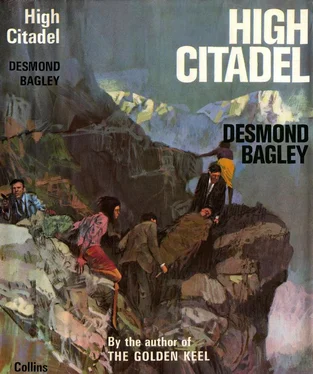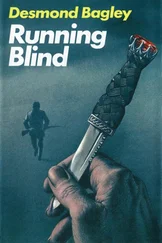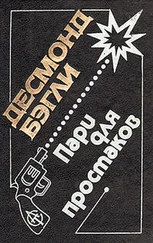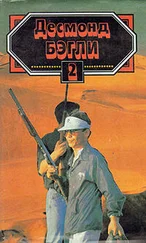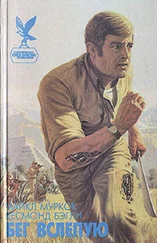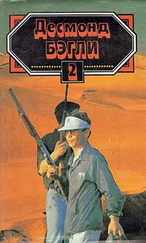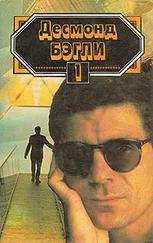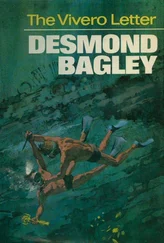After a while Forester ventured to open his eyes. To his relief he could see, not as well as he could normally, but he was not as blind as during that first shocking moment when he thought he had lost his sight. He looked over to where Rohde was ministering to Peabody and thought — yes, that’s another thing mountaineers have — dark glasses. He blinked painfully.
Rohde turned and Forester burst out laughing at the sight of him. He had a broad, black streak across his eyes and looked like a Red Indian painted to go on the warpath. Rohde smiled. ‘You too look funny, Ray,’ he said. Then more soberly, ‘Wrap a blanket round your head like a hood, so that it cuts out some of the glare from the side.’ Forester unfastened his pack and regretfully tore out the blanket from the side of the case. His pack would not be so comfortable from now on. The blanket provided enough material to make hoods for the three of them, and then Rohde said, ‘We must go on.’
Forester looked back. He could still see the huts and estimated that they had not gained more than five hundred feet of altitude although they had come a considerable distance. Then the rope tugged at his waist and he stepped out, following the stumbling figure of Peabody.
It was midday when they rounded the shoulder of the mountain and were able to see their way to the pass. Forester sank to his knees and sobbed with exhaustion and Peabody dropped in his tracks as though knocked on the head. Only Rohde remained on his feet, staring up towards the pass, squinting with sore eyes. ‘It is as I remembered it,’ he said. ‘We will rest here.’
Ignoring Peabody, he squatted beside Forester. ‘Are you all right?’
‘I’m a bit bushed,’ said Forester, ‘but a rest will make a lot of difference.’
Rohde took off his pack and unfastened it. ‘We will eat now.’
‘My God, I couldn’t,’ said Forester.
‘You will be able to stomach this,’ said Rohde, and produced a can of fruit. ‘It is sweet for energy.’
There was a cold wind sweeping across the mountainside and Forester pulled the jacket round him as he watched Rohde dig into the snow. ‘What are you doing?’
‘Making a windbreak.’ He took a Primus stove and put it into the hole he had dug where it was sheltered from the wind. He lit it, then handed an empty bean can to Forester. ‘Fill that with snow and melt it; we must drink something hot. I will see to Peabody.’
At the low atmospheric pressure the snow took a long time to melt and the resulting water was merely tepid. Rohde dropped a bouillon cube into it, and said, ‘You first.’
Forester gagged as he drank it, and then filled the can with snow again. Peabody had revived and took the next canful, then Forester melted more snow for Rohde. ‘I haven’t looked up the pass,’ he said. ‘What’s it like?’
Rohde looked up from the can of fruit he was opening. ‘Bad,’ he said. ‘But I expected that.’ He paused. ‘There is a glacier with many crevasses.’
Forester took the proffered can silently and began to eat. He found the fruit acceptable to his taste and his stomach — it was the first food he had enjoyed since the plane crash and it put new life into him. He looked back; the mine was out of sight, but far away he could see the river gorge, many thousands of feet below. He could not see the bridge.
He got to his feet and trudged forward to where he could see the pass. Immediately below was the glacier, a jumble of ice blocks and a maze of crevasses. It ended perhaps three thousand feet lower and he could see the blue waters of a mountain lake. As he looked he heard a whip-crack as of a stroke of lightning and the mutter of distant thunder and saw a plume of white leap up from the blue of the lake.
Rohde spoke from behind him. ‘That is a laguna ,’ he said. ‘The glaciers are slowly retreating here and there is always a lake between the glacier and the moraine. But that is of no interest to us; we must go there.’ He pointed across the glacier and swept his arm upwards.
Across the valley of the pass white smoke appeared suddenly on the mountainside and a good ten seconds afterwards came a low rumble. ‘There is always movement in the mountains,’ said Rohde. ‘The ice works on the rock and there are many avalanches.’
Forester looked up. ‘How much higher do we have to climb?’
‘About five hundred metres — but first we must go down a little to cross the glacier.’
‘I don’t suppose we could go round it,’ said Forester.
Rohde pointed downwards towards the lake. ‘We would lose a thousand metres of altitude and that would mean another night on the mountain. Two nights up here would kill us.’
Forester regarded the glacier with distaste; he did not like what he saw and for the first time a cold knot of fear formed in his belly. So far there had been nothing but exhausting work, the labour of pushing through thick snow in bad and unaccustomed conditions. But here he was confronted with danger itself — the danger of the toppling ice block warmed to the point of insecurity by the sun, the trap of the snow-covered crevasse. Even as he watched he saw a movement on the glacier, a sudden alteration of the scene, and he heard a dull rumble.
Rohde said, ‘We will go now.’
They went back to get their packs. Peabody was sitting in the snow, gazing apathetically at his hands folded in his lap. Forester said, ‘Come on, man; get your pack on,’ but Peabody did not stir. Forester sighed regretfully and kicked him in the side, not too violently. Peabody seemed to react only to physical stimuli, to threats of violence.
Obediently he got up and put on his pack and Rohde refastened the rope about him, careful to see that all was secure. Then they went on in the same order. First the more experienced Rohde, then Peabody, and finally Forester.
The climb down to the glacier — a matter of about two hundred feet — was a nightmare to Forester, although it did not seem to trouble Rohde and Peabody was lost in the daze of his own devising and was oblivious of the danger. Here the rock was bare of snow, blown clean by the strong wind which swept down the pass. But it was rotten and covered with a slick layer of ice, so that any movement at all was dangerous. Forester cursed as his feet slithered on the ice; we should have spikes, he thought; this is madness.
It took an hour to descend to the glacier, the last forty feet by what Rohde called an abseil. There was a vertical ice-covered cliff and Rohde showed them what to do. He hammered four of their makeshift pitons into the rotten rock and looped the rope through them. They went down in reverse order, Forester first, with Rohde belaying the rope. He showed Forester how to loop the rope round his body so that he was almost sitting in it, and how to check his descent if he went too fast.
‘Try to keep facing the cliff,’ he said. ‘Then you can use your feet to keep clear — and try not to get into a spin.’
Forester was heartily glad when he reached the bottom — this was not his idea of fun. He made up his mind that he would spend his next vacation as far from mountains as he could, preferably in the middle of Kansas.
Then Peabody came down, mechanically following Rohde’s instructions. He had no trace of fear about him — his face was as blank as his mind and all fear had been drained out of him long before, together with everything else. He was an automaton who did precisely what he was told.
Rohde came last with no one to guard the rope above him. He dropped heavily the last ten feet as the pitons gave way one after the other in rapid succession and the rope dropped in coils about his prostrate body. Forester helped him to his feet. ‘Are you okay?’
Rohde swayed. ‘I’m all right,’ he gasped. ‘The pitons — find the pitons.’
Читать дальше
Конец ознакомительного отрывка
Купить книгу
